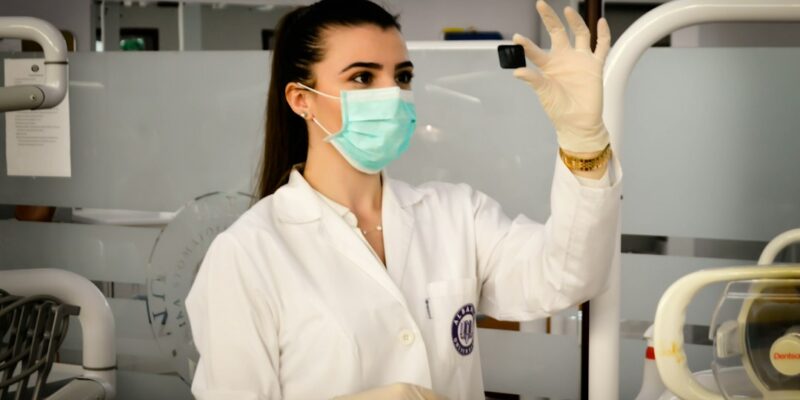
The Power of Prevention: Exploring the Life-Changing Benefits of Prioritizing Preventive Health
Preventive health is a concept that focuses on taking proactive measures to prevent diseases and maintain overall health and well-being. It involves adopting healthy lifestyle habits, getting regular check-ups, and staying up-to-date with vaccinations and screenings. Preventive health is crucial because it can help detect potential health issues early on, when they are easier to treat and manage. By prioritizing preventive health, individuals can reduce their risk of developing chronic diseases, improve their quality of life, and increase their lifespan.
Key Takeaways
- Preventive health is important for maintaining overall health and preventing chronic diseases.
- Prioritizing preventive health can lead to numerous benefits, including improved quality of life and reduced healthcare costs.
- Reactive health focuses on treating illnesses after they occur, while preventive health focuses on preventing them from happening in the first place.
- Individuals can take preventive health measures by practicing healthy habits, such as exercising regularly and eating a balanced diet.
- Healthcare providers play a crucial role in promoting preventive health and managing chronic diseases.
Preventive Health: What Is It and Why Is It Important?
Preventive health refers to the actions taken to prevent diseases and promote good health. It involves a combination of lifestyle choices, regular screenings, vaccinations, and other preventive measures. The goal of preventive health is to identify potential health risks early on and take steps to mitigate them before they become more serious.
Preventive health is important because it can help individuals avoid the onset of chronic diseases such as heart disease, diabetes, and cancer. By adopting healthy habits such as regular exercise, healthy eating, and avoiding tobacco and excessive alcohol consumption, individuals can significantly reduce their risk of developing these conditions. Additionally, preventive health measures can help detect diseases in their early stages when treatment is more effective and less costly.
The Benefits of Prioritizing Preventive Health
Prioritizing preventive health offers numerous benefits for individuals and society as a whole. One of the most significant benefits is the reduction in healthcare costs. By preventing diseases or detecting them early on, individuals can avoid costly medical treatments and hospitalizations. This not only saves money for individuals but also reduces the burden on healthcare systems.
Another benefit of prioritizing preventive health is the improvement in quality of life. By adopting healthy habits and getting regular check-ups, individuals can maintain good physical and mental health. This can lead to increased energy levels, improved mood, and better overall well-being. Preventive health measures can also help individuals avoid or manage chronic diseases, allowing them to live a more fulfilling and active life.
Furthermore, prioritizing preventive health can increase lifespan. By taking proactive measures to prevent diseases and maintain good health, individuals can significantly reduce their risk of premature death. Regular screenings and check-ups can help detect potential health issues early on, allowing for timely intervention and treatment. By addressing health concerns promptly, individuals can increase their chances of living a longer and healthier life.
Preventive Health vs. Reactive Health: Understanding the Difference
| Preventive Health | Reactive Health |
|---|---|
| Focuses on preventing diseases and illnesses before they occur | Focuses on treating diseases and illnesses after they have already occurred |
| Includes regular check-ups, screenings, and vaccinations | Includes doctor visits, medications, and surgeries |
| Can lead to better overall health and lower healthcare costs in the long run | Can be more expensive and may not always be effective in treating certain conditions |
| Encourages healthy lifestyle choices and habits | May require lifestyle changes after a diagnosis has been made |
| Can help identify potential health risks and address them before they become serious | May only address symptoms and not the underlying cause of a health issue |
Preventive health and reactive health are two different approaches to maintaining good health. Reactive health focuses on addressing health issues after they have already occurred, while preventive health aims to prevent these issues from arising in the first place.
Reactive health involves seeking medical attention only when symptoms or problems arise. For example, an individual may visit a doctor only when they are experiencing pain or discomfort. While reactive health is necessary for addressing acute conditions or emergencies, it is not as effective in maintaining long-term health.
On the other hand, preventive health involves taking proactive measures to prevent diseases and maintain good health. This includes adopting healthy lifestyle habits, getting regular check-ups and screenings, and staying up-to-date with vaccinations. Preventive health focuses on identifying potential health risks early on and taking steps to mitigate them before they become more serious.
Preventive health is more effective than reactive health because it allows for early detection and intervention. By identifying potential health issues before they become symptomatic, individuals have a better chance of successful treatment and management. Additionally, preventive health measures can help individuals avoid the development of chronic diseases altogether, reducing the need for reactive healthcare interventions.
Preventive Health Measures: What You Can Do to Stay Healthy
There are several practical tips and strategies that individuals can adopt to prioritize preventive health:
1. Regular exercise: Engaging in regular physical activity can help maintain a healthy weight, reduce the risk of chronic diseases, and improve overall well-being. Aim for at least 150 minutes of moderate-intensity aerobic activity or 75 minutes of vigorous-intensity aerobic activity per week.
2. Healthy eating: Follow a balanced diet that includes a variety of fruits, vegetables, whole grains, lean proteins, and healthy fats. Limit the consumption of processed foods, sugary drinks, and excessive salt and saturated fats.
3. Routine check-ups: Schedule regular check-ups with your healthcare provider to monitor your overall health and detect any potential issues early on. This includes screenings for conditions such as high blood pressure, cholesterol levels, and certain cancers.
4. Vaccinations: Stay up-to-date with vaccinations to protect yourself and others from preventable diseases. This includes vaccines for influenza, pneumonia, hepatitis, and human papillomavirus (HPV), among others.
5. Avoid tobacco and excessive alcohol consumption: Smoking and excessive alcohol consumption are major risk factors for various diseases, including cancer, heart disease, and liver disease. Quit smoking and limit alcohol intake to reduce your risk.
6. Practice safe sex: Use condoms and get regular screenings for sexually transmitted infections (STIs) to protect yourself and your partner.
7. Manage stress: Chronic stress can have negative effects on both physical and mental health. Practice stress management techniques such as exercise, meditation, deep breathing exercises, or engaging in hobbies to reduce stress levels.
By incorporating these preventive health measures into your daily routine, you can significantly reduce your risk of developing chronic diseases and maintain good overall health.
The Role of Healthcare Providers in Preventive Health
Healthcare providers play a crucial role in promoting preventive health. They are responsible for providing routine screenings, vaccinations, and patient education to help individuals maintain good health.
Regular screenings are an essential part of preventive health as they can help detect potential health issues early on. Healthcare providers can perform screenings for conditions such as high blood pressure, cholesterol levels, diabetes, and certain cancers. By identifying these issues early, healthcare providers can intervene and provide appropriate treatment and management strategies.
Vaccinations are another important aspect of preventive health. Healthcare providers can administer vaccines to protect individuals from preventable diseases such as influenza, pneumonia, hepatitis, and HP
By staying up-to-date with vaccinations, individuals can significantly reduce their risk of contracting these diseases and spreading them to others.
Patient education is also a key component of preventive health. Healthcare providers can educate individuals about healthy lifestyle habits, the importance of regular check-ups and screenings, and the benefits of vaccinations. By providing individuals with the necessary knowledge and tools to prioritize their health, healthcare providers can empower them to make informed decisions and take proactive measures to prevent diseases.
Preventive Health and Chronic Disease Management
Preventive health measures are not only effective in preventing diseases but also in managing chronic conditions. Chronic diseases such as diabetes, heart disease, and cancer can be better managed when detected early and treated promptly.
Regular check-ups and screenings can help individuals with chronic diseases monitor their condition and make necessary adjustments to their treatment plan. For example, individuals with diabetes can have their blood sugar levels regularly monitored to ensure they are within a healthy range. This allows healthcare providers to make appropriate changes to medication or lifestyle recommendations to keep the condition under control.
Additionally, preventive health measures such as regular exercise and healthy eating can help individuals manage chronic diseases more effectively. For example, engaging in regular physical activity can help control blood pressure and cholesterol levels in individuals with heart disease. Similarly, adopting a balanced diet can help individuals with diabetes manage their blood sugar levels.
By prioritizing preventive health measures, individuals with chronic diseases can improve their quality of life and reduce the risk of complications associated with their condition.
The Economic Impact of Preventive Health
Prioritizing preventive health not only benefits individuals but also has a positive economic impact. By preventing diseases or detecting them early on, healthcare costs can be significantly reduced.
Preventive health measures can help individuals avoid costly medical treatments and hospitalizations. By adopting healthy lifestyle habits and getting regular check-ups, individuals can reduce their risk of developing chronic diseases that require long-term and expensive treatments. This not only saves money for individuals but also reduces the burden on healthcare systems.
Furthermore, preventive health measures can increase productivity in the workforce. By maintaining good health and preventing diseases, individuals are more likely to be able to work and contribute to the economy. This reduces absenteeism and increases overall productivity, benefiting both individuals and society as a whole.
Investing in preventive health can also lead to long-term cost savings. By preventing diseases or detecting them early on, the need for expensive treatments and interventions is reduced. This can help control healthcare costs and ensure that resources are allocated more efficiently.
Overcoming Barriers to Prioritizing Preventive Health
While prioritizing preventive health is crucial, there are several barriers that individuals may face. These barriers include lack of time, resources, and knowledge. However, there are solutions to overcome these barriers:
1. Lack of time: Many individuals may feel that they do not have enough time to prioritize their health. However, it is important to remember that investing time in preventive health now can save time in the future by avoiding potential health issues. Prioritize your health by scheduling regular check-ups and screenings, and make time for physical activity and healthy eating.
2. Lack of resources: Some individuals may face financial constraints or lack access to healthcare services. However, there are often resources available to help overcome these barriers. Look for community clinics or programs that offer low-cost or free screenings and vaccinations. Additionally, take advantage of workplace wellness programs or insurance benefits that may cover preventive services.
3. Lack of knowledge: Many individuals may not be aware of the importance of preventive health or the specific measures they can take to prioritize their health. Educate yourself by reading reliable sources of information, attending health education programs, or consulting with healthcare providers. Take the initiative to learn about healthy lifestyle habits, recommended screenings, and vaccinations.
By addressing these barriers and taking proactive steps to prioritize preventive health, individuals can overcome these challenges and improve their overall well-being.
Embracing the Power of Prevention for a Healthier Future
In conclusion, preventive health is crucial for maintaining good health and well-being. By adopting healthy lifestyle habits, getting regular check-ups and screenings, and staying up-to-date with vaccinations, individuals can significantly reduce their risk of developing chronic diseases and improve their quality of life.
Prioritizing preventive health offers numerous benefits, including reducing healthcare costs, increasing lifespan, and improving productivity in the workforce. Healthcare providers play a vital role in promoting preventive health through routine screenings, vaccinations, and patient education.
While there may be barriers to prioritizing preventive health, such as lack of time, resources, and knowledge, there are solutions to overcome these challenges. By investing time and effort into preventive health now, individuals can enjoy a healthier future and reduce the risk of developing serious health issues. Embrace the power of prevention and make your health a priority for a better tomorrow.
FAQs
What are preventive health benefits?
Preventive health benefits are measures taken to prevent the onset or worsening of diseases or conditions. These measures include regular check-ups, screenings, vaccinations, and lifestyle changes.
What are the benefits of preventive health measures?
Preventive health measures can help detect diseases early, when they are easier to treat. They can also help prevent the onset of diseases altogether. Additionally, preventive health measures can improve overall health and quality of life.
What are some examples of preventive health measures?
Examples of preventive health measures include regular physical exams, cancer screenings, vaccinations, healthy eating habits, regular exercise, and avoiding risky behaviors such as smoking and excessive alcohol consumption.
How can I access preventive health services?
Preventive health services are often covered by health insurance plans. You can speak with your healthcare provider or insurance company to learn more about the specific preventive health services that are covered under your plan.
Are preventive health measures only for people with existing health conditions?
No, preventive health measures are important for everyone, regardless of whether or not they have existing health conditions. These measures can help prevent the onset of diseases and improve overall health and well-being.


















